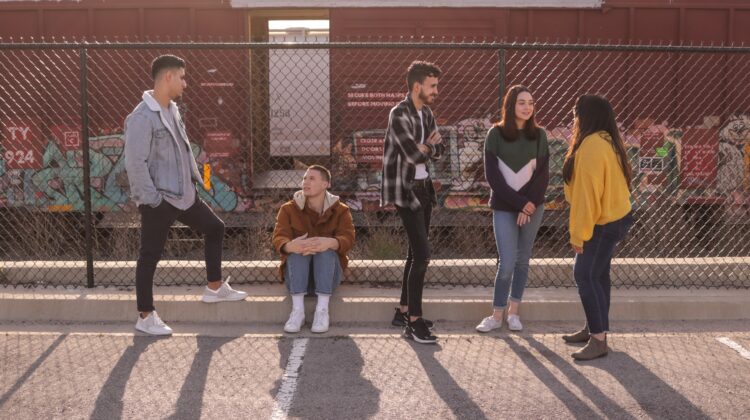
Adolescent kids and teenagers are often influenced by their peers. Their friends and companions can make a huge impact on their decisions. Thus, it can be a struggle sometimes to handle peer pressure.
Young kids are always attracted to follow the lifestyle of their friends. At times it can be detrimental. During such phases, as a parent, you need to defend your teen from making destructive choices.
Peer influence increases during the teenage years. Their impact is compelling in early to middle adolescence. Some teens begin consuming drugs or alcohol due to peer pressure. They want to be appreciated and accepted by their friends. The craving to belong to a group of friends can shape their behaviour. With peer insistence, they attempt to do something which they wouldn’t otherwise do.
Pros and Cons

Peer pressure can be positive. For instance, your child could be motivated to become more self-assured, choose new interests, or take keen participation in school activities.
However, sometimes it can be negative too. To please their friends, some adolescents may indulge in activities like smoking or other antisocial behaviour which they normally won’t do. A teen’s brain is always looking for new stimulation. He can’t always resist a bad idea. For instance, he may be swayed by a friend’s suggestion to paint graffiti on the high school wall, knowing full well the consequences of his actions.
At this stage, parents can play a crucial role in balancing peer influence. The article provides tips to parents as to how they can help their children in handling peer pressure:
Concerned About Peer Influence?
As a parent, you may doubt that your child is not behaving normally. You will know that your child is facing peer pressure if he starts behaving in awkward ways like:
- Unusual mannerisms and words in his speech
- Putting in more work hours at school or putting in less effort
- Dressing provocatively
- Using different words and mannerisms while talking
- Hearing the same music or viewing the same TV shows that his friends do
- Driving recklessly
- Imitating the hairstyle or jewellery or dyeing his hair or selecting the same clothes as his friends
- Suddenly realizing a love of working out at the gym after his friends start exercising
- Trying to be adventurous or disregarding norms
- Smoking, consuming drugs and alcohol
- Dating or engaging in sexual activities
You may be deeply concerned at this stage that your child is having atypical behaviour. But it is quite normal. You can help your child to come out of this phase if you know how to handle him tactfully.
Helping Your Child to Manage Peer Pressure
Parents can assist their children to cope with peer pressure by helping them to strike a balance between being themselves and going well with the group. Some ways you can help your child are:
Strong Self-esteem
Parents can help their children develop a strong sense of self-confidence. They can boost their child’s morale by encouraging their kids to try new things even when it is difficult.
You can help your child to be more confident by showing him how to act confidently in any situation in the first stage. You can applaud your child for trying hard. It will boost his self-esteem. With increased self-assurance, he will be able to handle his negative peer influence confidently.
Stay Calm
Stay calm when your child reveals to you about his peers and what they are doing. Do not get perturbed. Avoid overreacting, blaming, or lecturing as your child may not bring up the topics again. If his friends are shoplifting, make your child realize the consequences of the risky behaviour.
Shape Child’s Values
As a parent, you can instill values in your child that would form his character.
Your kid may find it difficult to say no to his friends and peers so that he can fit in the group. You may be worried for your kid as he tries to please his friends and attempts all risky things. But if your child is happy with who he is then he is less likely to be influenced by his friends. He will decide for himself what is good for him and will follow only some of the things that his friends do. With your influence, your child will know how to deal with peer pressure and make appropriate long-term choices in life.
Genuine Friend
If your child is facing negative peer pressure, make him realize that a friend who is influencing him to do risky, illegal things can hardly be called a friend. Your child will be able to see through the situation.
Stay Connected

Keep communicating with your kid as often as you can. Your child will let you know if he is facing any negative peer pressure.
Peer pressure can be difficult to resist. If you interact with your child regularly, it will make him feel comfortable to talk about his companions. He might share about how his friends force him into doing things that he doesn’t want to do. Let your child know that you are always there to support him. You can help him by talking to him and suggesting solutions.
Invite Friends
Persuade your child to bring his friends home. As a parent, you will know if his peers are having a good or bad influence on your child.
Timely Help
Your child may depend on you for help if he is facing risky situations. He may be facing tremendous pressure from his friends while he is in a group. He may text or call you. Also, he might feel uneasy to tell you in front of his friends. To tackle this, you can agree on a coded message.
You can provide timely support to your child at this stage as he has made a positive choice of calling you. With your cooperation, your child can now steer clear of the tricky situation.
Teach Core Values
Your child may be insisting on more independence. Make your child realize that if he does what his friends demand then that it is not independence. Rather he should maintain his core values in any situation.
Provide Solutions
Your child could be persuaded into doing things that he is not comfortable with. His friends may be forcing him to drink, and he may be finding it difficult to say no. You can teach your child refusal skills. Rather than saying no directly to his friends, he can say that he is allergic to drinks and their smell.
Your encouragement will help your child to handle situations tactfully. A sympathetic listening and regular communication about your expectations will help shield your child from negative peer pressure.
Offer More Choices
If your child is under some negative peer influence then as a parent you need to talk to him gently about it. Listen to your child carefully without judging and make him realize the adverse impact of friends on his behaviour. Allow him to figure out that it is his peer influence that is responsible for it.
You can compromise with your child in some ways by giving him more independence. Allow him to wear clothes of his choice or have a haircut that helps him bond with his peers. By giving him more independence, you are allowing your child to make fewer precarious preferences.
Diverse Friends
You can encourage your child to expand his social network. He can join sports clubs, gymnasiums or engage in family activities and widen his contacts. That way, he will garner a lot of support and will not feel isolated and lost if a friendship goes wrong.
The above tips would help parents deal positively with the child facing peer pressure. Boys are more likely to be convinced by peers than girls. As a parent, you have to handle your child gently.
Conclusion
Teenagers develop a certain amount of self-confidence and self-image by connecting with their peers. As teenagers develop friendships, they learn to care about other people’s feelings, opinions, views, and well-being. It is at this stage that parents can develop a strong emotional bond with their kids and shape their values for a better future.
Hope you could get some important information from this article. Please let us know in the comments how you help your kid handle peer pressure. We would be happy to read!
Leave a Reply